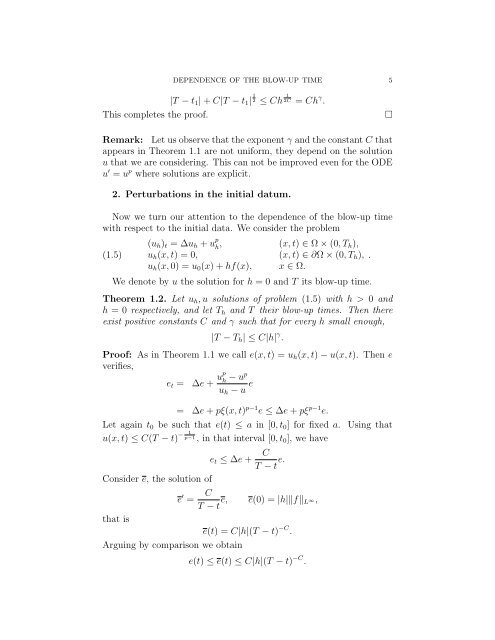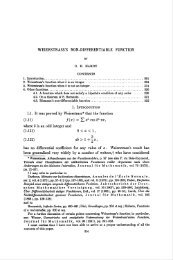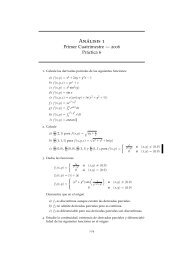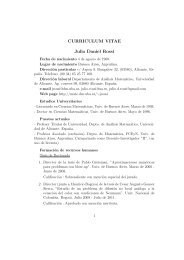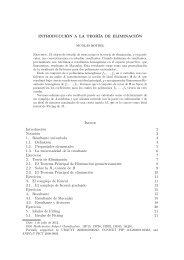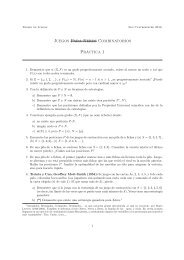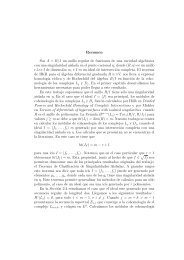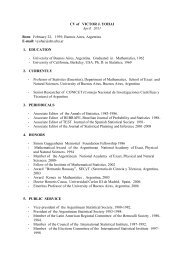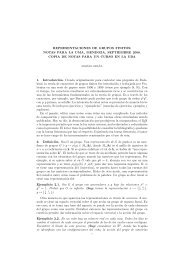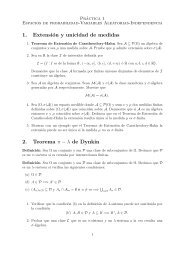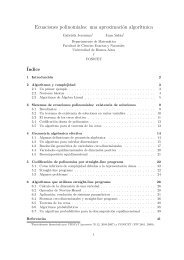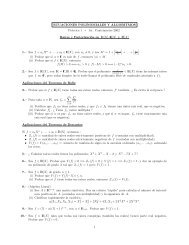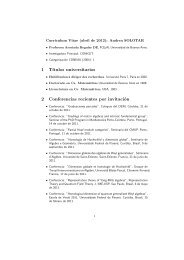Dependence of the blow-up time with respect - Universidad de ...
Dependence of the blow-up time with respect - Universidad de ...
Dependence of the blow-up time with respect - Universidad de ...
Create successful ePaper yourself
Turn your PDF publications into a flip-book with our unique Google optimized e-Paper software.
DEPENDENCE OF THE BLOW-UP TIME 5<br />
|T − t1| + C|T − t1| 1<br />
2 ≤ Ch 1<br />
2C = Ch γ .<br />
This completes <strong>the</strong> pro<strong>of</strong>. <br />
Remark: Let us observe that <strong>the</strong> exponent γ and <strong>the</strong> constant C that<br />
appears in Theorem 1.1 are not uniform, <strong>the</strong>y <strong>de</strong>pend on <strong>the</strong> solution<br />
u that we are consi<strong>de</strong>ring. This can not be improved even for <strong>the</strong> ODE<br />
u ′ = u p where solutions are explicit.<br />
2. Perturbations in <strong>the</strong> initial datum.<br />
Now we turn our attention to <strong>the</strong> <strong>de</strong>pen<strong>de</strong>nce <strong>of</strong> <strong>the</strong> <strong>blow</strong>-<strong>up</strong> <strong>time</strong><br />
<strong>with</strong> <strong>respect</strong> to <strong>the</strong> initial data. We consi<strong>de</strong>r <strong>the</strong> problem<br />
(1.5)<br />
(uh)t = ∆uh + u p<br />
h ,<br />
uh(x, t) = 0,<br />
(x, t) ∈ Ω × (0, Th),<br />
(x, t) ∈ ∂Ω × (0, Th),<br />
uh(x, 0) = u0(x) + hf(x), x ∈ Ω.<br />
We <strong>de</strong>note by u <strong>the</strong> solution for h = 0 and T its <strong>blow</strong>-<strong>up</strong> <strong>time</strong>.<br />
Theorem 1.2. Let uh, u solutions <strong>of</strong> problem (1.5) <strong>with</strong> h > 0 and<br />
h = 0 <strong>respect</strong>ively, and let Th and T <strong>the</strong>ir <strong>blow</strong>-<strong>up</strong> <strong>time</strong>s. Then <strong>the</strong>re<br />
exist positive constants C and γ such that for every h small enough,<br />
|T − Th| ≤ C|h| γ .<br />
Pro<strong>of</strong>: As in Theorem 1.1 we call e(x, t) = uh(x, t) − u(x, t). Then e<br />
verifies,<br />
et = ∆e + <strong>up</strong><br />
h − <strong>up</strong><br />
uh − u e<br />
= ∆e + pξ(x, t) p−1 e ≤ ∆e + pξ p−1 e.<br />
Let again t0 be such that e(t) ≤ a in [0, t0] for fixed a. Using that<br />
1<br />
−<br />
u(x, t) ≤ C(T − t) p−1 , in that interval [0, t0], we have<br />
et ≤ ∆e + C<br />
T − t e.<br />
Consi<strong>de</strong>r e, <strong>the</strong> solution <strong>of</strong><br />
that is<br />
Arguing by comparison we obtain<br />
e ′ = C<br />
e, e(0) = |h|fL∞, T − t<br />
e(t) = C|h|(T − t) −C .<br />
e(t) ≤ e(t) ≤ C|h|(T − t) −C .<br />
.


